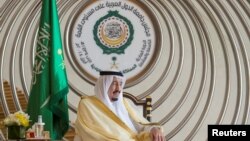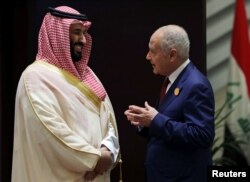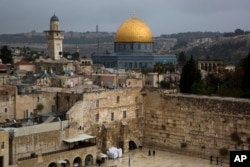Arab leaders gathered for the 29th annual Arab summit in the Saudi town of Dhahran, amid discussion about the catastrophic condition of many regional states. Those leaders present focused on the regional conflict with Iran, the internal conflict in Yemen, the brutal and bloody civil war in Syria, political and military divisions in Libya and the U.S. recognition of Jerusalem as the capital of Israel.
Jordan's King Abdullah gave a brief summary of the key issues facing the Arab region, before handing over the official duties of presiding over the 29th annual summit to Saudi King Salman, who is hosting this year's event.
Salman focused on Jerusalem, which is the top item on the summit agenda, as well as what he called Iranian "meddling" in the affairs of Arab states.
He said that he holds what he calls the terrorist Houthi militia, supported by Iran, total responsibility for the suffering of the Yemeni people and urges the United Nations to condemn the Houthis for firing 119 missiles at Saudi cities, including the holy city of Mecca.
Arab League head Ahmed Aboul Gheit criticized the decision by U.S. President Donald Trump to recognize Jerusalem as the capital of Israel, in addition to decrying the catastrophic situation in Syria.
He said the central Arab cause of Palestine has witnessed a major setback, after what he calls the "illegal" decision by the United States regarding Jerusalem (as the capital of Israel) and efforts to liquidate the Palestinian cause at the expense of the Palestinian people. The Palestinians, he complains, are themselves divided, despite efforts to unite them.
He also criticized the Syrian government for the collapse of the state and the catastrophic condition of the country, while decrying the "hail of rockets, both foreign and local, over the heads of the Syrian people."
Egyptian President Abdel Fattah el-Sissi complained Arab states are facing unprecedented efforts to destroy their very existences and divide them as organic entities for the first time since their independence. Many state institutions, he asserts, are under threat, and several states have collapsed.
Sissi went on to urge outside parties to stop meddling in the affairs of Arab states and to stop supporting terrorist organizations he argues are wreaking havoc in the Arab world.
Palestinian President Mahmoud Abbas insisted East Jerusalem will "always remain the capital of a Palestinian state," while blasting Israel for its actions with regard to the international community.
He said the international community has issued hundreds of resolutions at the U.N. Security Council regarding the situation in Palestine, but claims Israel has ignored every one of them, acting like a state above the law.
Arab leaders avoided discussing the ongoing conflict between key Gulf States, as well as Egypt, with Qatar, following a regional blockade against Doha last June after charges the tiny emirate supports terrorist groups in the region. Arab commentators noted the subject would be discussed behind closed doors, rather than in public.






